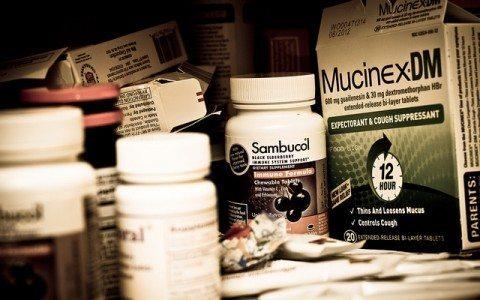Can I Take Expired Medications?

We’ve all see expiration dates on medicine bottles and containers, and probably most of us have been in the situation where we’ve wanted a painkiller only to find it’s a couple of years out of date. What to do? Ditch it and bear the pain, or take it anyway and hope for the best?
In some circumstances, it’s best to replace the expired medications but others are safe to take well beyond the expiration date printed on the packaging. Understanding a little about these printed dates, why they’re there and what they mean, will help you decide if medicine is safe to take.
The Printed Dates on Medicine Containers
In 1979 a law was passed that required drug manufacturers to print expiration dates on their products. They’re not there for fun, or to make manufacturers jump through a few more hoops before bringing products to market, but they’re not quite the same as a ‘best before’ label on a milk container.
The dates printed on medicines indicate the last day that the effectiveness, potency and safety of the drug are guaranteed. It doesn’t necessarily mean that the medicine can’t, or shouldn’t be taken.
The Food and Drug Administration (FDA) conducted a study at the request of the military to determine the shelf life of medicines. Obviously the military hold a vast stock of medications, and with many drugs having a relatively short ‘active’ time printed on the label, they needed to know if it was necessary to replace the stockpile every few years. Partly for efficiency and partly for economic reasons, they’d prefer not to face disposal of unused medication if it was still good to use.
The SLEP (Shelf Life Extension Program) tested over 3,000 lots of stockpiled medicines contained in over 120 different types of drug products, testing for effectiveness over an average of 5.5 years. Only 18% failed the tests.
Storing for Maximum Shelf Life
The drugs tested in the military study were stored in optimized conditions. Most of us at home don’t keep our medicines in the best places. For instance, the bathroom cabinet is subject to heat and humidity, both of which can contribute to a shortened shelf life.
The refrigerator is a more effective storage area since it’s both cool and dark, but of course that raises safety issues for families with children. No one wants to leave potentially dangerous drugs where little hands can easily reach them.
Other factors that can contribute to medication degradation include the packaging. Stored and sealed in their original containers, many medicines have a longer shelf life than that printed on the label. Pharmacies, however, will often open packaging in order to dispense in quantities prescribed by the doctor. This can reduce the shelf life.
In most cases, the effect is more likely a reduction in the potency, rather than it becoming dangerous to take.
Which Medicines To Discard
Certain medications are best discarded once they reach their expiration date, and others you can use your best judgment.
For instance:
- Some ophthalmic drops contain preservatives, making them potentially unsafe when they’ve expired.
- EpiPens, designed to administer measured dosages of injected drugs degrade and should be discarded when they reach the expiration date.
- Medicine that gone cloudy, powdery, smells strongly or is crumbling.
- Creams and potions that have dried out.
- Vaccines, blood or biological products degrade quickly.
When it’s important that medicine is working at full potency (such as antibiotics or medication for angina), or that used in life threatening situations (such as treating anaphylaxis), in-date drugs are vital.
Disposing of Medications
Unused, unwanted, or expired medications are best disposed of through a DEA National Prescription Take-Back event, where collection sites are set up in local communities. Similar events may be organized by local law agencies.
If you can’t find a local Take-Back event, most medicines are safe to dispose of in household trash. Take precautions against accidental or deliberate misuse by disguising medicines in substances such as dirt, coffee grounds or anything else people wouldn’t want to eat, then put the whole mess into a sealable container or bag before placing it in the household trash. As a further precaution against identification, scratch all identifying marks, including your own name, off any prescription or medication labels.
Medication that would be especially harmful to someone it’s not prescribed for should be flushed down the sink or toilet if it’s not possible to return them via a medicine take-back program.
In summary, most regular medication lasts far longer than it says on the label when it’s stored correctly and kept in a sealed container. If liquid medicine looks or smells off, it probably is and you shouldn’t take risks.




